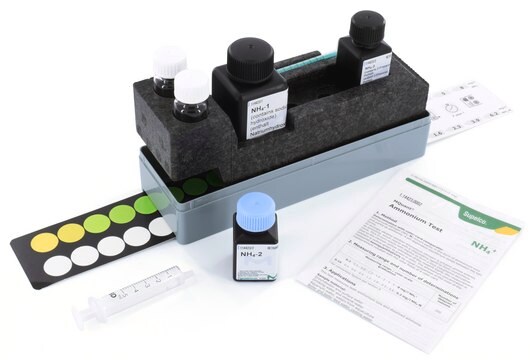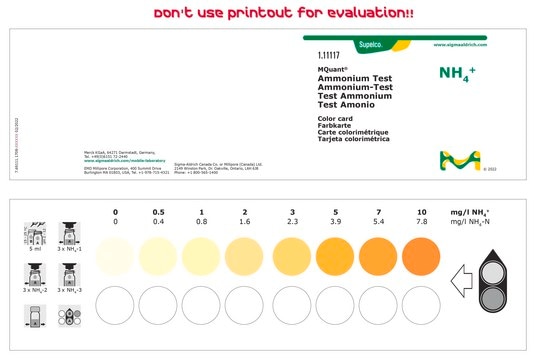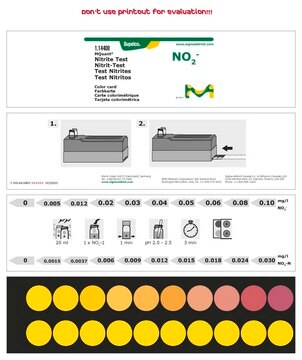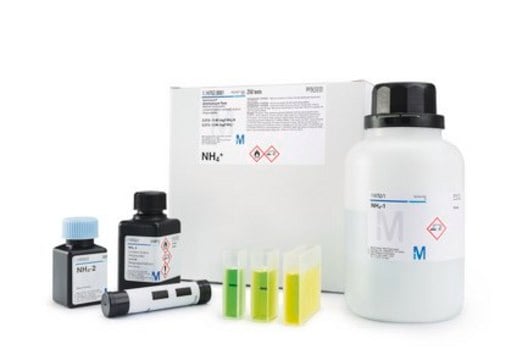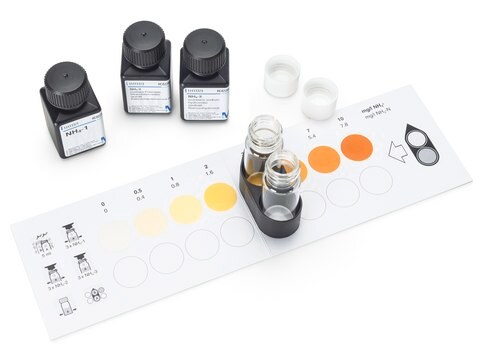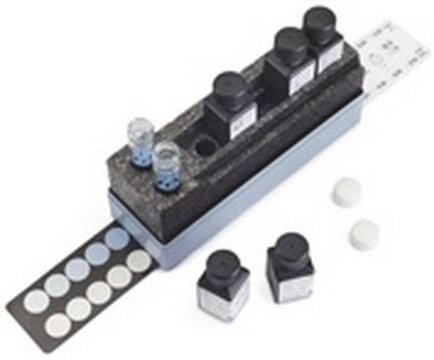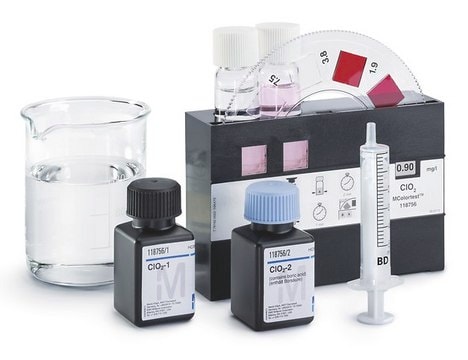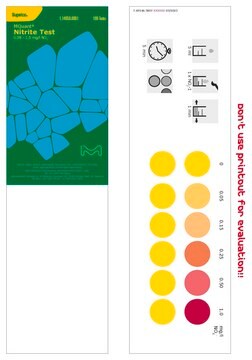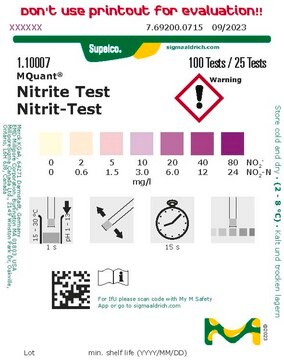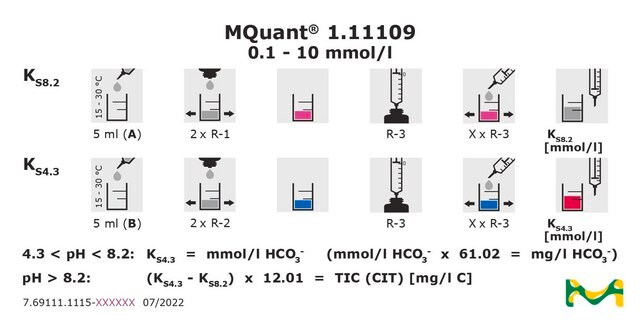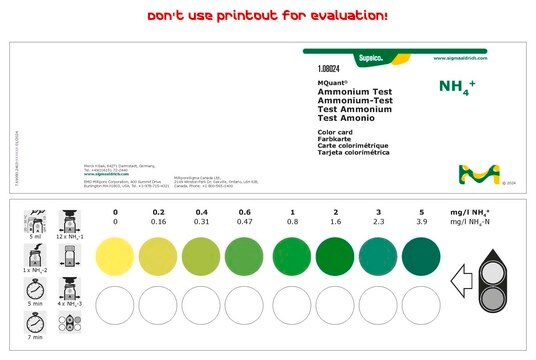1.14774
Nitrite Test Kit, colorimetric
0.1-10 mg/L (NO₂⁻), MQuant®
Sinónimos:
Nitrite Visual Test Kit
Iniciar sesiónpara Ver la Fijación de precios por contrato y de la organización
About This Item
Código UNSPSC:
41116116
NACRES:
NA.24
Productos recomendados
Nombre del producto
Nitrite Test, colorimetric, 0.1-10 mg/L (NO2-), for use with MCOLORTEST®
analitos específicos
nitrite
Nivel de calidad
intervalo de medida
0.1-10 mg/L (NO2-)
compatibilidad
for use with MCOLORTEST®
método de detección
colorimetric
temp. de almacenamiento
15-25°C
Descripción general
Method: colorimetric with color-disk comparator 0.1 - 0.2 - 0.4 - 0.6 - 1.0 - 1.8 - 3.0 - 6.0 - 10 mg/l NO MQuant®
Nitrite is naturally present in soil, water and food, and regularly testing its concentration is essential for many applications. With the MQuant® Nitrite test (formally MColortest®) Nitrites can be closely monitored in drinking and ground water as well as in process, waste, or aquarium water. The test can be used in:
Method
In acidic solution nitrite ions react with sulfanilic acid to form a diazonium salt, which in turn reacts with N-(1-naphthyl)ethylenediamine dihydrochloride to form a red-violet azo dye. The nitrite concentration is measured semiquantitatively by visual comparison of the color of the measurement solution with the color fields of a color disk. The test evaluates the color reaction based on the transmitted light method. So even turbid and colored water samples can be analyzed without further preparation.
The color disk is made of very durable, lightfast plastic, thus suitable for industrial areas and wet environments.
- Groundwater and surface water, seawater
- Drinking water and mineral water
- Waters from aquaculture
- Boiler and boiler feed water, cooling water
- Wastewater and electroplating wastewater
- Food after appropriate sample pretreatment
- Soils after appropriate sample pretreatment
Method
In acidic solution nitrite ions react with sulfanilic acid to form a diazonium salt, which in turn reacts with N-(1-naphthyl)ethylenediamine dihydrochloride to form a red-violet azo dye. The nitrite concentration is measured semiquantitatively by visual comparison of the color of the measurement solution with the color fields of a color disk. The test evaluates the color reaction based on the transmitted light method. So even turbid and colored water samples can be analyzed without further preparation.
The color disk is made of very durable, lightfast plastic, thus suitable for industrial areas and wet environments.
Aplicación
- Clinical and laboratory features of urinary tract infections in young infants: Discusses diagnostic challenges and characteristics of urinary tract infections in infants, stressing the importance of accurate detection to guide treatment (Lo et al., 2018).
- Differentiating Kawasaki disease from urinary tract infection in febrile children with pyuria and C-reactive protein elevation: Focuses on differential diagnosis in pediatric care, which can influence the choice of nitrite tests for accurate and timely diagnosis (Han and Lee, 2018).
- Early features of Kawasaki disease with pyuria in febrile infants younger than 6 months: Addresses the overlap of urinary symptoms in Kawasaki disease, underscoring the utility of nitrite tests in complex cases (Yoon et al., 2018).
- Current practice on the management of pre-operative urine dipstick results in women undergoing gynaecological surgery in Wales: Reviews procedures related to pre-surgical care in gynaecology, indicating broader applications of nitrite testing in hospital protocols (Walker et al., 2019).
Información legal
MCOLORTEST is a registered trademark of Merck KGaA, Darmstadt, Germany
MQUANT is a registered trademark of Merck KGaA, Darmstadt, Germany
Palabra de señalización
Warning
Frases de peligro
Consejos de prudencia
Clasificaciones de peligro
Eye Irrit. 2 - Skin Irrit. 2 - Skin Sens. 1
Código de clase de almacenamiento
11 - Combustible Solids
Clase de riesgo para el agua (WGK)
WGK 2
Certificados de análisis (COA)
Busque Certificados de análisis (COA) introduciendo el número de lote del producto. Los números de lote se encuentran en la etiqueta del producto después de las palabras «Lot» o «Batch»
¿Ya tiene este producto?
Encuentre la documentación para los productos que ha comprado recientemente en la Biblioteca de documentos.
Los clientes también vieron
Nuestro equipo de científicos tiene experiencia en todas las áreas de investigación: Ciencias de la vida, Ciencia de los materiales, Síntesis química, Cromatografía, Analítica y muchas otras.
Póngase en contacto con el Servicio técnico